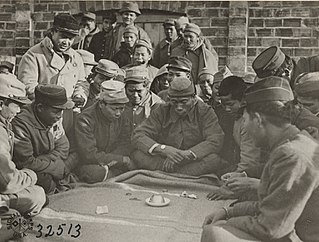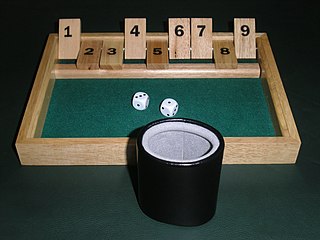
Craps is a dice game in which players bet on the outcomes of the roll of a pair of dice. Players can wager money against each other or against a bank. Because it requires little equipment, "street craps" can be played in informal settings. While shooting craps, players may use slang terminology to place bets and actions.

Chuck-a-luck, also known as birdcage, or sweat rag, is a game of chance played with three dice. It is derived from grand hazard and both can be considered a variant of sic bo, which is a popular casino game, although chuck-a-luck is more of a carnival game than a true casino game. The game is sometimes used as a fundraiser for charity.

Rock paper scissors is an intransitive hand game, usually played between two people, in which each player simultaneously forms one of three shapes with an outstretched hand. These shapes are "rock", "paper", and "scissors". The earliest form of "rock paper scissors"-style game originated in China and was subsequently imported into Japan, where it reached its modern standardized form, before being spread throughout the world in the early 20th century.

Hazard is an early English game played with two dice; it was mentioned in Geoffrey Chaucer's Canterbury Tales in the 14th century.

Yahtzee is a dice game made by Milton Bradley. It was first marketed under the name of Yahtzee by game entrepreneur Edwin S. Lowe in 1956. The game is a development of earlier dice games such as Poker Dice, Yacht and Generala. It is also similar to Yatzy, which is popular in Scandinavia.

Shut the box is a game of dice for one or more players, commonly played in a group of two to four for stakes. Traditionally, a counting box is used with tiles numbered 1 to 9 where each can be covered with a hinged or sliding mechanism, though the game can be played with only a pair of dice, pen, and paper. Variations exist where the box has 10 or 12 tiles. In 2018 the game had a renaissance in Liverpool, England, when it became the house game at Hobo Kiosk pub on the Baltic Triangle. It was popularized by DJ duo Coffee and Turntables and became the most played board game in Merseyside for 4 years in a row.

Cee-lo is a gambling game played with three six-sided dice. There is not one standard set of rules, but there are some constants that hold true to all sets of rules. The name comes from the Chinese Sì-Wŭ-Liù (四五六), meaning "four-five-six". In America it is also called "See-Low," "Four-Five-Six," "The Three Dice Game," "Roll-off!," and by several alternative spellings, as well as simply "Dice." In China it is also called "Sān Liù Bàozi" (三六豹子), or "Three-Six Leopards". In Japan, it is known as "Chinchiro" (チンチロ) or "Chinchirorin" (チンチロリン).
Farkle, or Farkel, is a dice game similar to or synonymous with 1000/5000/10000, Cosmic Wimpout, Greed, Hot Dice, Squelch, Zilch, or Zonk. Its origins as a folk game are unknown, but the game dates back to at least the mid-1980s. It has been marketed commercially since 1996 under the brand name Pocket Farkel by Legendary Games Inc. While the basic rules are well-established, there is a wide range of variation in both scoring and play.

Master Player Screen featuring The Spindle is a short accessory designed for the Pen & Paper role-playing game Dungeons & Dragons.

Crown and Anchor is a simple dice game, traditionally played for gambling purposes by sailors in the Royal Navy as well as those in the British merchant and fishing fleets.

Chō-Han Bakuchi or simply Chō-Han (丁半) is a traditional Japanese gambling game using dice.

Pass the Pigs is a commercial version of the dice game Pig, but using custom asymmetrical throwing dice, similar to shagai. It was created by David Moffatt and published by Recycled Paper Products as Pig Mania! in 1977. The publishing license was later sold to Milton Bradley and the game renamed Pass the Pigs. In 1992, publishing rights for North America were sold to Winning Moves Games USA, which acquired the game outright from David Moffat Enterprises in early 2017.
A set of dice is intransitive if it contains three dice, A, B, and C, with the property that A rolls higher than B more than half the time, and B rolls higher than C more than half the time, but it is not true that A rolls higher than C more than half the time. In other words, a set of dice is intransitive if the binary relation – X rolls a higher number than Y more than half the time – on its elements is not transitive. More simply, A normally beats B, B normally beats C, but A does not normally beat C.

Miwin's Dice are a set of nontransitive dice invented in 1975 by the physicist Michael Winkelmann. They consist of three different dice with faces bearing numbers from one to nine; opposite faces sum to nine, ten or eleven. The numbers on each die give the sum of 30 and have an arithmetic mean of five.
Kitsune is used in English to refer to fox spirits in Japanese folklore.

Casino security refers to the measures that are taken at casinos to protect the establishment's money, property and patrons. The security protects the casino and its customers from violent crime, theft, and other inappropriate behavior.

Las Vegas is a board game designed by Rüdiger Dorn and published by Ravensburger in 2012. It is named after the city of Las Vegas in Nevada, United States and has a gambling theme. The game was also nominated for the Spiel des Jahres prize in 2012.

Mandarin Chinese: 博餅; pinyin: Bóbǐng is a Chinese dice game traditionally played as part of the celebration of the Mid-Autumn Festival. It is traditionally played with six dice and a china bowl.

Trictrac is a French board game of skill and chance for two players that is played with dice on a game board similar, but not identical, to that of backgammon. It was "the classic tables game" of France in the way that backgammon is in the English-speaking world.

Diceball! is a board game in which two players roll dice to simulate a baseball game, one representing the visiting team and the other the home team. Both players use the dice to throw the baseball from the mound to the plate and field the ball on defense. Diceball! was designed to mirror the statistical reality of baseball. A regular game of Diceball! without extra innings lasts about 45 minutes.

















